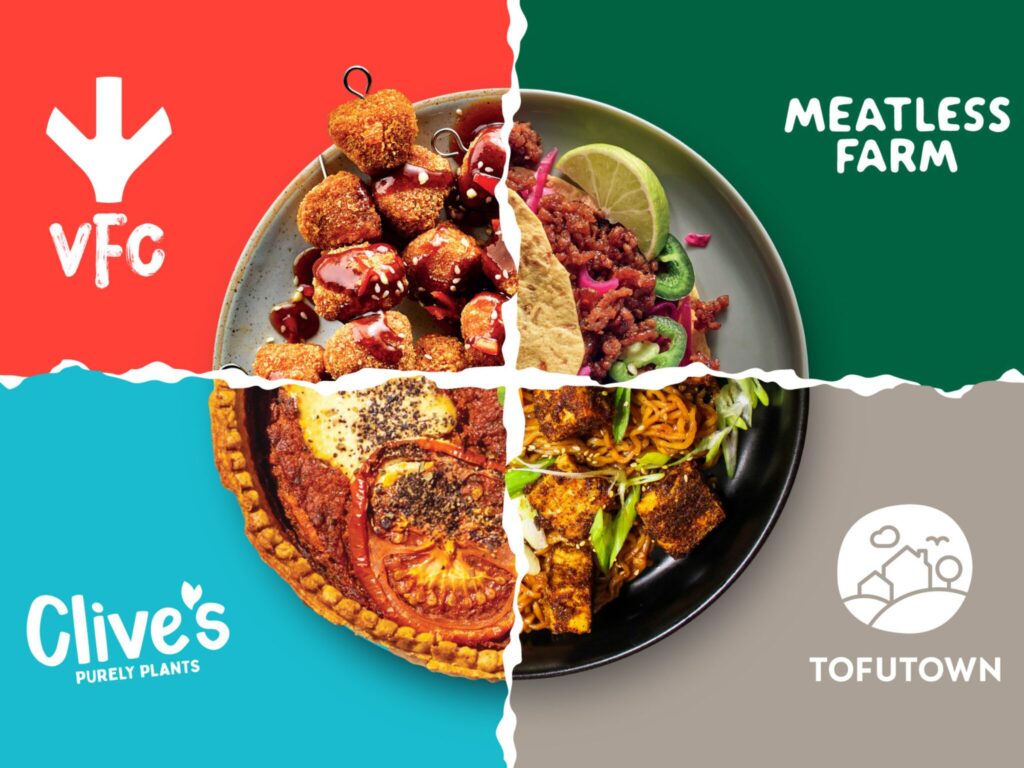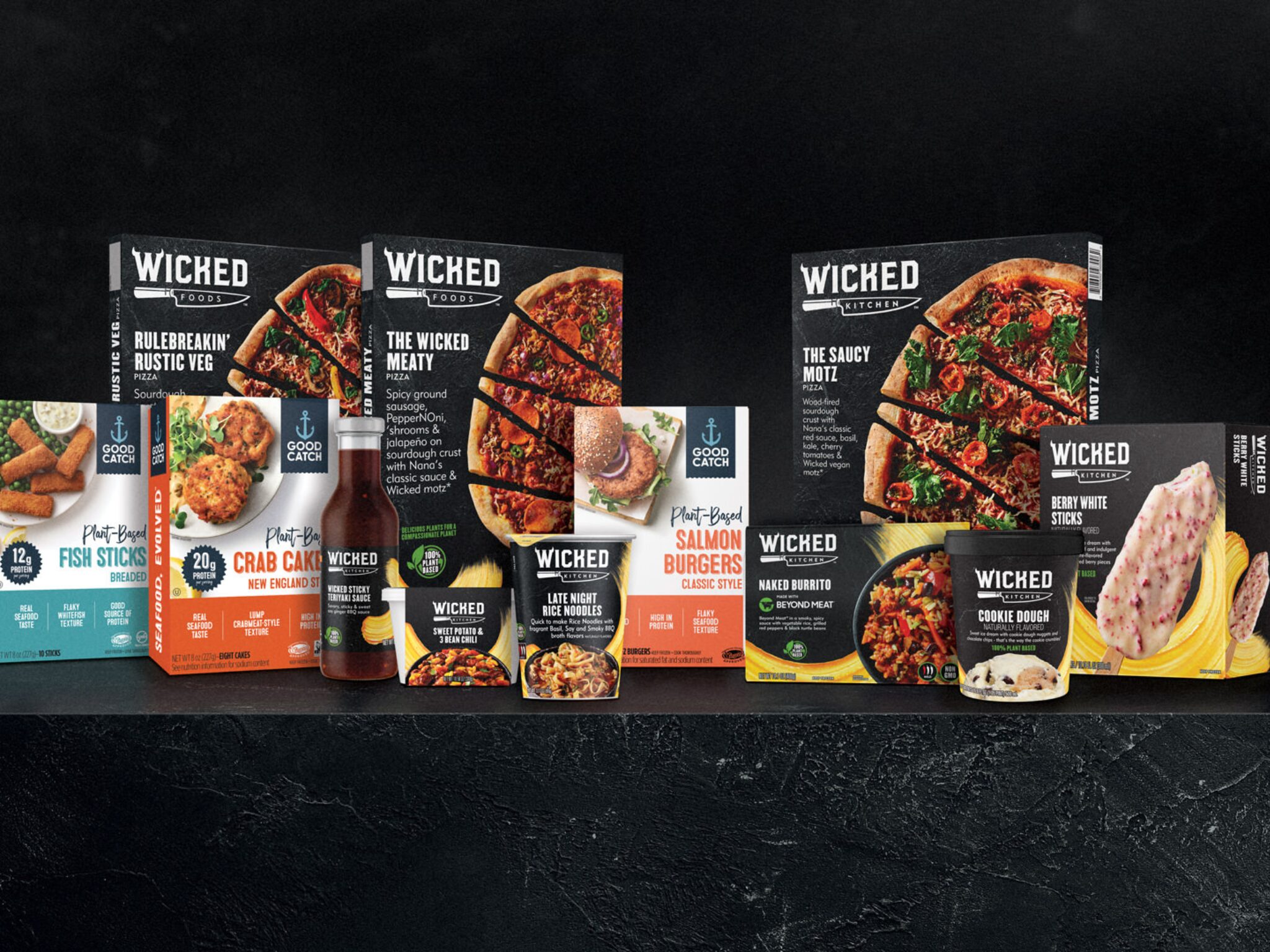Wicked Kitchen Acquired by Ahimsa Companies in Latest Plant-Based Consolidation Move
5 Mins Read
Global plant-based food leader Wicked Kitchen has been acquired by the newly formed Ahimsa Companies, which seeks to lead an “industry-wide consolidation effort”.
Ahimsa Companies, a newly formed holding company by the Ahimsa Foundation, has acquired vegan food brand Wicked Kitchen and its subsidiaries Good Catch and Current Foods for an undisclosed sum.
With global plant-based sales flatlining last year, investment on the decline, and meat analogues facing a downturn in purchases in the US, many have suggested that consolidation could be key to the future of the category. This is Ahimsa Companies’ aim too, leading a sector-wide consolidation effort to generate opportunities for vertical integration and scale-up.
“We’ve said all along that consolidation will drive success for the plant-based industry,” said group CEO Matt Tullman. “As Ahimsa Companies brings together more brands, it can leverage this strength to help stabilise and shape the new landscape for the plant-based industry.”
Why Ahimsa Companies acquired Wicked Kitchen

Wicked Kitchen, a maker of plant-based ready meals, desserts, snacks and ingredients, was founded by brothers Derek and Chad Sarno in 2016. Until last year, the former was head of plant-based innovation at Tesco, the UK’s largest retailer, which brought the brand to market in 2018.
The startup has since grown internationally, with products available in over 20,000 retail locations and a roster of more than 150 offerings. And, as it began to expand, Wicked Kitchen itself brought other brands into the fold. In September 2022, it acquired vegan seafood producer Good Catch, another company founded by the Sarno brothers.
Last year, it bought another plant-based seafood startup, Current Foods. This came amid a rollercoaster-like period for seafood analogues, which made up just 1% of sales of the overall meat analogues category. While brands like Konscious Foods and Hooked Foods expanded their footprint, others were forced to shut, such as Ordinary Seafood and New Wave Foods.
Consolidation has been pinpointed as a solution to the volatility. Peter McGuinness, CEO of plant-based meat giant Impossible Foods, alluded to this in a recent interview with Bloomberg. “There are a lot of companies that are making food that’s not great food. There’s 200 plant-based companies in America – probably only need three, or two. So there’s a lot of small companies making not-so-great food and people are having bad first impressions,” he said.
“You’re going to be left with a couple of brands and private labels, and that’s going to be the category.”
Ahimsa Foods similarly believes consolidation is “critical to the growth and success” of the sector, and now plans to add multiple brands, as well as manufacturing and sales enablement businesses, to its roster, with the goal of vertically integrating and leveraging resources.
Wicked Kitchen, meanwhile, will expand to additional retailers, add to its foodservice offerings, and invest in further product innovation following the acquisition. “We are aligned in our mission, and we believe that Wicked Kitchen is stronger today and better positioned to serve the health and environmentally conscious consumer who does not want to sacrifice on taste or convenience,” said Pete Speranza, who has been the brand’s CEO since 2020.
He and the Sarno brothers will remain shareholders in the new business.
Plant-based M&A deals ramp up

This is far from the only consolidation deal in the vegan sector recently. In fact, last year saw M&A deals in the overall food industry jump by 57%, according to one report, with the estimated value climbing by 20% to reach £2.1B.
“There is potential for increased M&A activity in areas of the plant-based market that are showing resilience or growth, such as indulgent categories or products offered by discount retailers,” said Sam Sharp, senior associate and food and drink head at British-Irish law firm Browne Jacobson. “Companies might look to acquire or invest in brands that have successfully navigated the current economic climate or are aligned with consumer trends towards healthier and more sustainable options.”
In February, Vegan Food Group – another recently formed holding company evolving from the plant-based meta brand VFC – acquired Germany’s TofuTown, months after buying Clive’s Purely Plants and Meatless Farm. The company is continuing to explore further acquisition opportunities, with the goal of becoming a “vegan Unilever”.
A month earlier, US non-dairy coffee creamer brand Nutpods was acquired by newly formed CPG investment arm MPearlRock, around the same time Australian plant-based meat maker v2food took over ready meal brands Soulara and Macros. Meanwhile, vegan fast-casual chain Next Level Burger purchased restaurant group Veggie Grill (alongside its Más Veggies taco chain) in January as well.
This followed Indian superfood brand Nourish You’s acquisition of alt-dairy startup One Good in late 2023, in one of the country’s largest plant-based M&A deals. British artisanal vegan cheesemaker Palace Culture was taken over by The Compleat Food Group (formerly Winterbotham Darby) a month earlier, just as Canada’s Protein Powered Farms bought Lovingly Made Ingredients, a plant protein extrusion facility.
And, in October, Finnish alt-dairy brand Oddlygood acquired Nordic brand Planti, while recently founded US company Superlatus agreed to buy plant-based dairy and egg startup Spero, months after it agreed to purchase precision fermentation dairy leader Perfect Day’s consumer arm The Urgent Company.
That month, German food conglomerate Pfeifer & Langen also earned a majority stake in Rügenwalder Mühle, which produces vegan sausages. And Australia’s All G Foods spun off its alt-meat brand Love Buds, which merged with Fenn Foods’ vEEF to form The Aussie Plant-Based Co.
“In the context of flat or declining category demand, consolidation, and M&As are vital for rapid growth in the plant-based sector. These strategies allow companies to scale, innovate, and navigate through resilience challenges more effectively,” Vegan Food Group co-founder Matthew Glover told Green Queen in February. “Combining resources and expertise through M&As enables businesses to expand their market presence and improve supply chains efficiently, which is crucial when organic growth is hard to achieve.”



